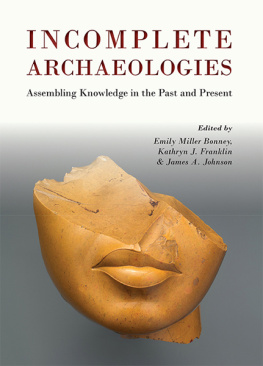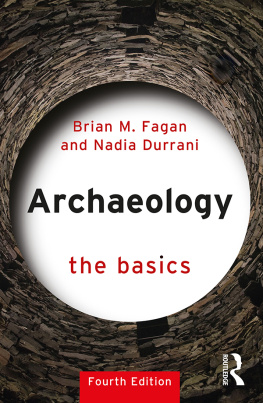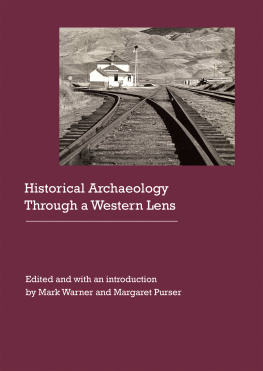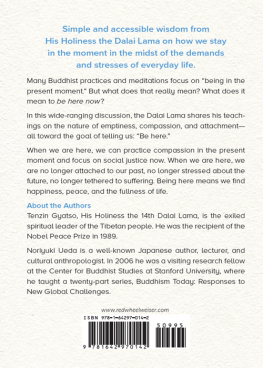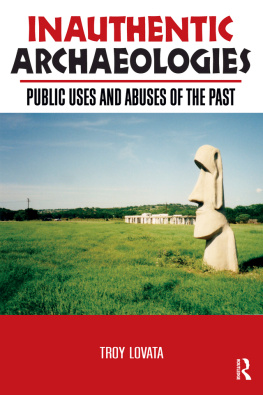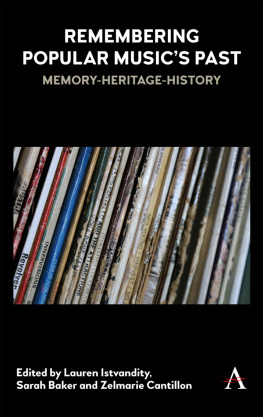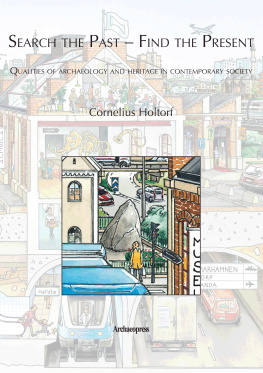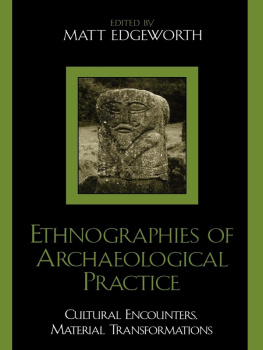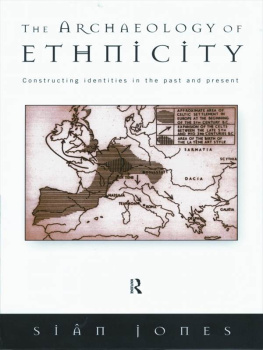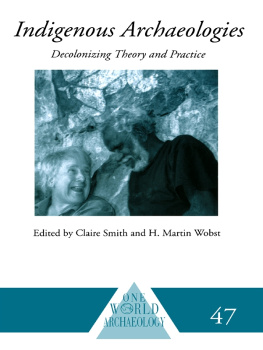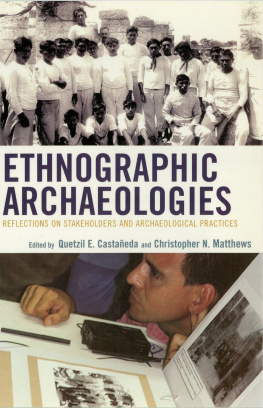Published in the United Kingdom in 2016 by
OXBOW BOOKS
10 Hythe Bridge Street, Oxford OX1 2EW
and in the United States by
OXBOW BOOKS
1950 Lawrence Road, Havertown, PA 19083
Oxbow Books and the individual contributors 2016
Paperback Edition: ISBN 978-1-78570-115-3
Digital Edition: ISBN 978-1-78570-116-0
Kindle Edition: ISBN 978-1-78570-117-7
PDF Edition: ISBN 978-1-78570-118-4
A CIP record for this book is available from the British Library
Library of Congress Cataloging-in-Publication Data
Names: Bonney, Emily Miller. | Franklin, Kathryn J. | Johnson, James A. (James Alan)
Title: Incomplete archaeologies : assembling knowledge in the past and present / edited by Emily Miller Bonney, Kathryn J. Franklin and James A. Johnson.
Description: Oxford : Oxbow Books, 2016. | Includes bibliographical references.
Identifiers: LCCN 2015041336 (print) | LCCN 2015046730 (ebook) | ISBN 9781785701153 (paperback) | ISBN 9781785701160 (digital) | ISBN 9781785701160 (epub) | ISBN 9781785701177 (mobi) | ISBN 9781785701184 (pdf)
Subjects: LCSH: Archaeology--Philosophy. | Archaeology--Methodology. | Antiquities--Collection and preservation. | Archaeological assemblages. | Knowledge, Theory of. | Eurasia--Antiquities. | Mediterranean Region--Antiquities. | Archaeology--Case studies. | Social archaeology--Case studies.
Classification: LCC CC72 .I53 2016 (print) | LCC CC72 (ebook) | DDC 930.1--dc23
LC record available at http://lccn.loc.gov/2015041336
All rights reserved. No part of this book may be reproduced or transmitted in any form or by any means, electronic or mechanical including photocopying, recording or by any information storage and retrieval system, without permission from the publisher in writing.
Printed in the United Kingdom by Hobbs the Printers Ltd, Totton, Hampshire
For a complete list of Oxbow titles, please contact:
UNITED KINGDOM
Oxbow Books
Telephone (01865) 241249, Fax (01865) 794449
Email:
www.oxbowbooks.com | UNITED STATES OF AMERICA
Oxbow Books
Telephone (800) 791-9354, Fax (610) 853-9146
Email:
www.casemateacademic.com/oxbow |
Oxbow Books is part of the Casemate Group
Front cover: Fragment of a Queens Face, Egypt, New Kingdom. The Metropolitan Museum of Art, Purchase, Edward S. Harkness Gift, 1926, www.metmuseum.org
Contents
Kathryn J. Franklin, James A. Johnson and Emily Miller Bonney
Hannah Cobb
Emily Miller Bonney
Hannah Chazin
James A. Johnson
Adrienne C. Frie
Claudia Chang and Rebecca Beardmore
Kevin Garstki
Joseph Gonzalez
Kathryn J. Franklin
Contributors
REBECCA BEARDMORE
Ph. D. candidate
Institute of Archaeology
University College London
UK
DR CLAUDIA CHANG
Professor of Anthropology
Department of Anthropology and
Archaeology,
Sweet Briar College
Sweet Briar
VA
USA
HANNAH CHAZIN
PhD candidate,
Department of Anthropology,
University of Chicago
IL
USA
DR HANNAH COBB
Lecturer in Archaeology
School of Arts, Languages and Culture,
University of Manchester
UK
DR KATHRYN JANE FRANKLIN
Lecturer in Social Sciences
School of the Art Institute of Chicago
IL
USA
ADRIENNE FRIE
Ph.D. candidate in Archaeology,
University of Wisconsin-Milwaukee
WI
USA
KEVIN GARSTKI
Ph.D. candidate in Archaeology,
University of Wisconsin-Milwaukee
WI
USA
DR JOSEPH M. GONZALEZ
Associate Professor of Liberal Studies,
California State University Fullerton
CA
USA
DR JAMES A. JOHNSON
Lecturer,
Department of Anthropology,
University of Chicago
IL
USA
DR EMILY MILLER BONNEY
Associate Professor Liberal Studies,
California State University Fullerton
CA
USA
Acknowledgements
We would like to thank a number of generous individuals and benevolent influences, without which this volume would not have been possible. Warm thanks to the organizers of the 2013 EAA meetings in Pilsen, Czech Republic, where the original session Some Assembly Required: Assembling people, objects, discourses and landscapes in archaeology, which sparked this book, was held. We are overwhelmingly grateful to the original participants in that session for their papers, comments, conversation, and intellectual generosity: Rebecca Beardmore, Claudia Chang, Hannah Chazin, Hannah Cobb, Chris Fowler, Adrienne Frie, Kevin Gartski, Lara Ghisleni, Joseph Gonzalez, Juhani Gradistanac, Anna Guengrich, Mariya Ivanova, Liliana Janik, John Janusek, Florica Matau, Dimitrij Mlekuz, Sophie Moore, Matthew Murray, Ladislav Smejda, Scott Smith, Andrea Vianello, and Nancy Wicker. We would also like to give express thanks to the scholars Chris Fowler and Carl Knappett, who provided peer review for the volume, for their heroic efforts. Finally, thanks to Julie Gardiner at Oxbow Books for seeing the potential in our idea and pushing us hard to finish.
Introduction: towards incomplete archaeologies?
Kathryn J. Franklin, James A. Johnson and Emily Miller Bonney
This volume is concerned with assembling. We take as our object the assembly of things, persons, ideas, times and spaces, as well as the effective surfaces created through such processes assemblages and the agencies invoked and sustained by assembling, dismantling and re-assembling.
In this collection of chapters we seek to move beyond the perceived complete and final affordances of the assemblage to a more thorough and critical interrogation of the always-incomplete processes of assembling. The assemblage has long been a mainstay in archaeology and has recently undergone serious re-examination and categorical revision (Latour 1999; 2005; Harris 2012, drawing upon DeLanda 2006; Fowler 2013). We wish to push the edge of discourse forward by recuperating to assemblages aggregate complexity, temporality and contingence; our primary strategy is a dismantling of allegedly complete and finished groups of archaeological objects and a shift of our focus to the intrinsic incompleteness of the processes involved in constructing social agents and their material worlds.
Critically, and perhaps paradoxically, we focus on the ongoing, contingent nature of assembling that highlights categorical incompleteness: that is, a condition of being-in-process, unfinished and open to further addition and transformation. While we build upon newly implemented and somewhat (re)invigorated approaches to the archaeological assemblage, we also draw focus to the ways in which archaeological inquiry remains rooted in notions of completeness and finalism. Such inquiries and their subject matter potentially distract, if not mislead, scholars from developing more comprehensive understandings of the continually ongoing and necessarily contingent processes of assembling that are both bound to and masked by the notion of assemblage. We suggest that instead of treating assemblages as fixed points from which the meaning of the past is revealed that we expand the scope of our investigations to explore how the complexity of meaning making involves multiple actions, temporalities and contingencies that are never finished, never quite whole. We acknowledge the scholars, and their analyses, that have critically redefined the ontology of assemblages, arguing that they are in-process or historically contingent in their entangledness, bundledness, or enmeshedness (Keane 2005; Harris 2012; Hodder 2012; Fowler 2013). However, once we assert that assemblages are incomplete the practices of material production, maintenance and reproduction take center-stage and our priority must be their
Next page
